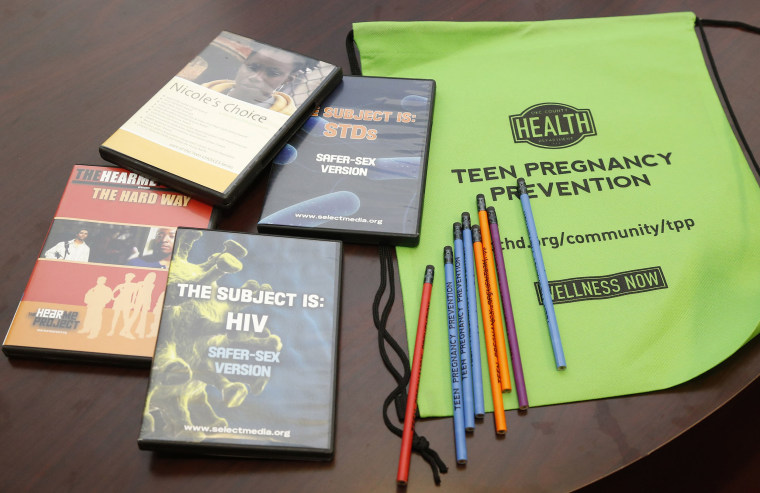WASHINGTON — The U.S. Department of Health and Human Services has agreed to pull back, at least temporarily, from an earlier decision to cancel funds for a popular federal grant program to prevent teen pregnancy.
NBC News reported on March 20 that Trump Administration political appointees had overruled agency career officials in ending the Teen Pregnancy Prevention Program last year. Two days later, the administration agreed to preserve some of the program’s funding, according to court documents provided to NBC.
The administration said it would set aside, through August, funds for three plaintiffs who argued HHS had unlawfully terminated the Obama-era program.
Skye Perryman, a lawyer for Democracy Forward, a nonprofit legal organization representing the plaintiffs, said internal notes and emails NBC published last week "support our contention that the government acted arbitrarily and unlawfully in terminating the grants.”
The three plaintiffs to the case — the city of Baltimore, the Healthy Teen Network which represents grantees across the country, and King County (Seattle) in Washington state — will still stop receiving grant funding from the program as of June 30. However, the government’s filing temporarily protects the funding in the federal budget through August, when the parties expect a legal decision on the future of the program.
The move represents a significant walk-back from the administration’s original 2017 decision to cancel the program, which many medical professionals credit with helping to drive the nation’s teen pregnancy rate to an all-time low.
It means the program’s funding will be protected in the budget during litigation instead of being redistributed to other unrelated government programs. The grantees receive a total of $3.47 million annually in funding.
Based on the internal emails and notes, NBC News reported that the program’s abrupt cancellation in July of 2017 was directed by Trump political appointees over the objections of career experts at HHS.
Later that week, in talks with lawyers representing one of the grantees, the government agreed to preserve some of the funding.
In the agency’s internal notes revealed last week, Evelyn Kappeler, who for eight years has led the Office of Adolescent Health, which administers the program, repeatedly expressed concerns about terminating the program, but appeared out of the decision-making loop and at one point was driven to tears.
The plaintiffs claimed the newly obtained emails show that HHS violated the Administrative Procedure Act that bars arbitrary decision-making and that the political appointees thwarted the will of Congress.
Representatives of Democracy Forward say they will also file a motion on Thursday asking that the money continue to flow as long as the case is pending.
Political leadership at HHS contended the program is ineffective and had previously shared with NBC a fact sheet stating that 73 percent of the projects funded by the program “had no impact or had a negative impact on teen behavior, with some teens more likely to begin having sex, to engage in unprotected sex or to become pregnant” — an argument that conflicts with the program’s proven success rate.
The notes and emails showed that three appointees with strict pro-abstinence beliefs — including Valerie Huber, the then-chief of staff for the department's Office of the Assistant Secretary for Health — guided the process to end the program.
The program has had bipartisan support in Congress and trained more than 7,000 health professionals and supported 3,000 community-based organizations since its inception in 2010.
Haywood L. Brown, president of the American College of Obstetricians and Gynecologists, has called the program “vital.” The administration’s earlier decision to halt the program, Brown said in a statement, is “highly unusual” and a “step backward for ensuring healthy moms and healthy babies.”
